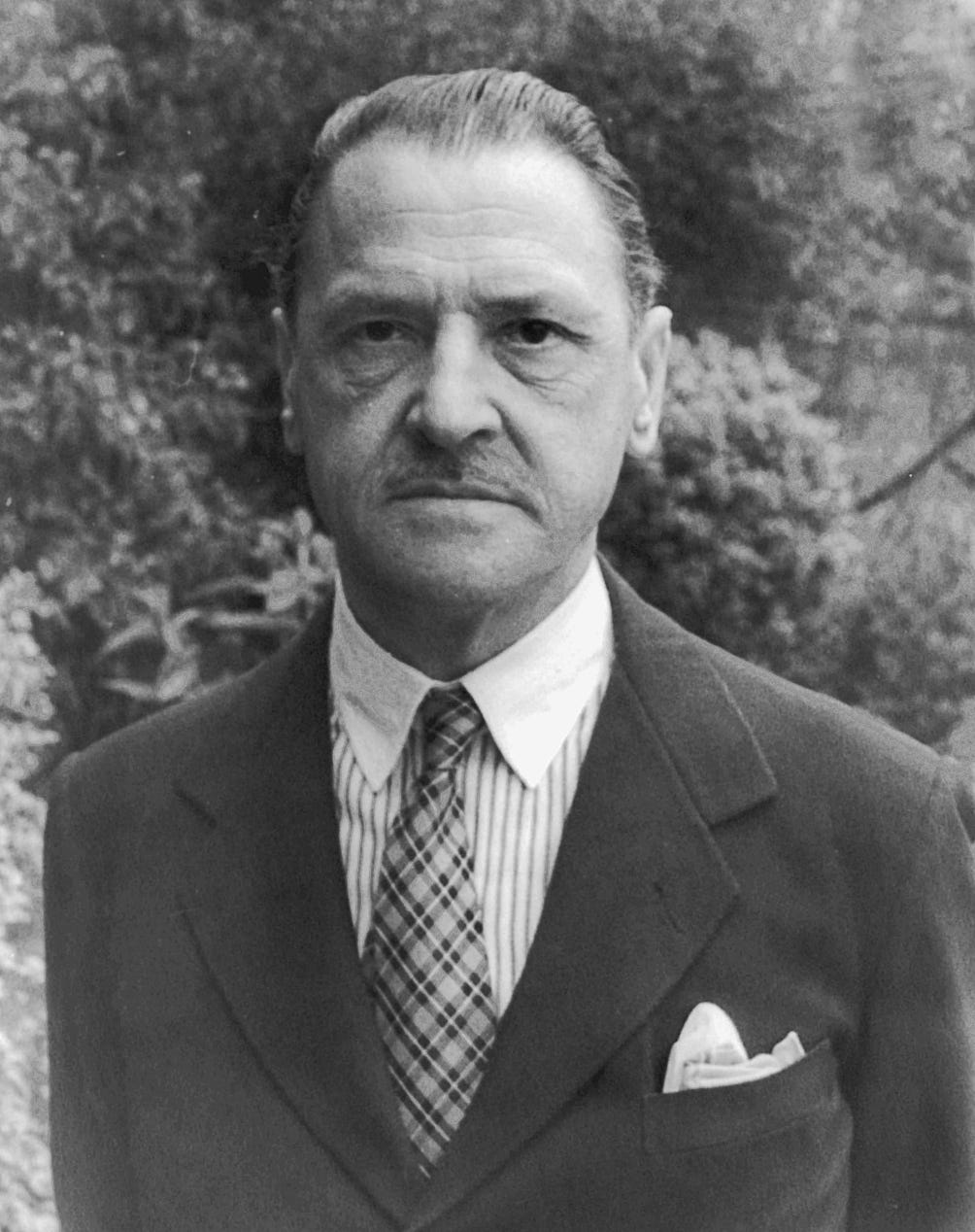'Of Human Bondage'
W. Somerset Maugham’s masterful novel probes ultimate questions.

“Then there's the night, too. Lying there and thinking about all the stupid things I've done during the day. And all those hours in between when I do all those stupid things.”
- Charlie Brown
Leave it to a musical—no, not Hamilton, ‘You’re a Good Man, Charlie Brown’—to nail adult life in one bleak line. We may not share Charlie Brown’s self-doubting bent. But who, on their very worst days, can’t relate?
What Charles Schulz knew is that we’re our own worst critics. Sensing judgment, and intuiting that something, or someone, is measuring us, we play the judge ourselves. Motives, decisions, swings and misses—everything adds up. Before we know it, we’re looking up at a kind of personal scoreboard. Like Charlie Brown, we sigh.
To the reality of self-judgment, which, in post-Christian, American culture is nothing less than final judgment, all the causes, dogmas, life revisions, and self-esteeming catechisms have nothing on the scoreboard. Day in, day out, the sodden thing keeps tally, logging runs, hits, and errors until the game is over.
If this essay pins anything to the wall, let it be that deep down we all know the scoreboard’s there, and that a life fully considered means asking what Vladimir Lenin might:
Who keeps it?
I start here, with this vague sense of a transcendent moral standard, because the Western refrain for over a century has been that there is none. Rather, and having thrown God out on the grounds that He’s either nonexistent, or at worst, disinterested (or if interested, He’s less of a judge and more a benevolent mascot who applauds whatever we do), we call the game ourselves, even as we’re playing it.
What’s true for your scoreboard (morally speaking) may not be true for mine. And with no ultimate arbiter, who are any of us to judge someone else’s game?
This kind of relativistic, open theism, borders another, and in some ways, more direct assumption—this material life is all there is. We make our own rules, a lá Calvinball, and we might be hard or easy on ourselves in keeping score. But this game is it. Being in charge naturally makes us home team, referee, and scorekeeper all at once—a kind of secular trinity for self-actualizing, individualism.
Believing or not, you can find this post-Christian drumbeat everywhere. Social media shouts it; art, film, and fashion tow the line but with more sophistication. She one with variation of the life is empty until you find your own truth and live it out message—reminds us, these notions have been part of the fabric for a long time. So long, in fact, that it’s hard to remember when fashionable rejections of God in order to be one’s own god (little ‘g’ mind you) made clear-thinking, genteel churchgoers blush.
Going back there takes us to Europe and England (the usual culprits), where we find modernism and realism, two of the ice cream flavors, artistically speaking, that helped the medicine go down. At their most potent, we see them in a coming-of-age novel that still makes lists of the greatest novels ever written—William Somerset Maugham’s ‘Of Human Bondage’. For the record, and even while serving up atheism and nihilism—stronger bromides than today’s open theism—Maugham’s novel poses some great, if ultimately misanswered questions.
Can we overcome the wounds of our past?
Given, he assumes, a meaningless universe offering no transcendent help, can we master our passions, let go of regrets, and live with some degree of happiness, stability, and selflessness?
These are first world problems, to be fair. Growing up with relative affluence, education, and a sense of the staggering opportunities before us means struggling with them. While Maugham gives us struggle, his novel goes further, serving up what might be the most plain-faced rejection of God and Christianity in a work of fiction.
To the question of mastering passions and beating one’s scoreboard (so to speak), Maugham and his protagonist Philip Carey answer: yes I can do those things, and I don’t need any help from God or any transcendent meaning to do them well enough.
Like Ibsen, Chekhov, and a few others who set the secular tone for a century of literature, Maugham’s answers are cosmic. In orphan - art student - young doctor Philip Carey, he chisels a fine portrait, reminding us that the struggle to find one’s station in life is evergreen. But in declaring the hard atheist-nihilist position so abruptly, he opens himself to challenge.
With me so far? Let’s wade further.
It’s Like A Coming of Age…
On the merits, the novel is unparalleled. Broad in scope, well-paced, and with the interior depth of a Russian novel, ‘Of Human Bondage’ ranks among the best bildungsromans of the modern age. But unlike the legions of young, misunderstood protagonists who would follow him, Philip Carey doesn’t end with college. Instead, Maugham takes us several decades into Carey’s adulthood, where passions, infatuation, and the unhealed wound of losing his parents at a young age simmer painfully to middle age.
Moreover, ‘Of Human Bondage’ is semi-autobiographical—both the author and his protagonist lost their parents early, loved the arts, and studied medicine. Many see Philip Carey’s debilitating club foot as a corollary for Maugham’s lifelong stammer, his homosexuality (or both). This makes Maugham’s take on ultimate questions more potent and personal than we realize.

‘Of Human Bondage’ came out (pun intended) in 1915, well into the European continent’s pivot away from Christianity. In the novel's early chapters, Maugham reminds us that England’s pivot came much later. With Philip’s adoptive guardian Uncle William, the vicar of Blackstable, Maugham cues up the broadly Christian-Anglican norms, expectations and belief system—all of which Philip rejects as a rite of passage. Philip is nine when his mother dies.
From the start, Philip’s Uncle William is cold, and unapproving—every bit the stiff, petulant vicar in your average BBC series. Near the end of boarding school, Philip’s first taste of independence is rejecting William’s wish that he matriculate to Oxford and train for the clergy. Instead, Philip goes bohemian. Studying in Germany, he soaks up continental Romanticism like a sponge, and turns his eye to the arts, sex, and self-fulfillment. Some hundred and ten years after its publication, these archetypes still resonate. For an American equivalent of the church patriarch out to spoil everyone’s fun, look no further than John Lithgow in Footloose.
But familiar prejudices aside, the novel is an achievement.
Serious readers won’t wonder why it became, and remains, a critical hit. Maugham has one goal—charting Philip’s total evolution—and he executes it to near perfection. With plain, crisp prose that early critics thought too pedestrian, Philip’s journey is potent, compelling, and always forward-moving. Anyone who struggled for a goal, a relationship, or to break into a profession can relate to Philip Carey.
To Maugham’s credit, and with the exception of some thirty, mostly European painters he dwells on for tone and texture, (Pissarro, Sisley, Monet, and Renoir, to name a few), there’s little dawdling. With recurring interior monologue, Philip bares his soul. He grows, questions, reflects, but never bores us. Take, for example, Philip’s discovery that his time in Paris trying, and failing to become an artist was no total loss.
“He thought the best thing he had gained in Paris was a complete liberty of spirit, and he felt himself at least absolutely free. In a desultory way he had read a good deal of philosophy, and he looked forward with delight to the leisure of the next few months… sometimes great philosophers seemed to have nothing to say to him, but at others he recognized a mind with which he felt himself at home. He was like the explorer in Central Africa who comes suddenly upon wide uplands, with great trees in them and stretches of meadow, so that he might fancy himself in an English park. He delighted in the robust sense of Thomas Hobbes; Spinoza filled with awe.”1
In the same chapter, a spat with Uncle William causes Philip to reflect on his own cool belligerence—a trait, he realizes, that goes back to the loss of his parents.
“He had begun to realize what a great loss he had sustained in the death of his father and mother. That was one of the differences in his life which prevented him from seeing things in the same way as other people. Among strangers he had grown up as best he could, but he had seldom been used with patience or forbearance. He prided himself on his self-control… he had acquired calmness of demeanor and under most circumstances, an unruffled exterior, so that now he could not show his feelings. People told him he was unemotional; but he knew that he was at the mercy of his emotion: an accidental kindness touched him so much that sometimes he did not venture to speak in order not to betray the unsteadiness of his voice.”2
With the death of Philip’s parents, Maugham preloads the journey in a few short chapters. Between the rigid Uncle William—the type who dines at the same time, always eating an egg before the Sunday evening service to keep his energy up—and an impotently feeble Aunt, Philip fends for himself. Bullies at Philip’s boarding school compound feelings of rejection and unworthiness by mocking him for his club foot.
Intelligent, inward, and eager to strike out on his own, Philip plunges headlong into what Søren Kierkegaard called the ‘aesthetic’ stage of life: art, eroticism, and raw experience. This takes him to Germany, and then to Paris where Philip banters in cafés while trying to become a painter.

Like a Non-Believing Street Preacher
Even in Babylon, iron sharpens iron.
Having colored Christianity as stuffy and useless with Philip’s vicar Uncle, Maugham enlightens Philip through conversations with his friends. In Germany, he meets Hayward, a dashing, careless English law student who fancies himself Lord Byron. Impressed by Hayward, and having dislodged himself from the influence of church and boarding school, Philip adopts a vague universalism—or as Hayward puts it, believing in “the Whole, the Good, and the Beautiful.”
Filled with wanderlust, and having waded into the spiritual-but-not-religious waters of open theism and West Coast yoga groups, Philip moves to Paris. There, and among other strivers he meets Fanny, a fellow art student who works her tail off while living in poverty, and Cronshaw, a cynical intellectual given to drinking bouts.. In an eye-raising exchange, Maugham lets Cronshaw take the driver’s seat. Philip thinks he’s moved on from God and religion, but Cronshaw (channeling Nietzsche) derides him for hanging onto a Christian framework without knowing it.
Cronshaw: “It’s the dread of hell if you sin and the hope of Heaven if you are virtuous.”
Philip: “But I believe in neither.”
Cronshaw: “You have thrown aside a creed, but you have still preserved the ethic which was based upon it. To all intents you are a Christian still, and if there is a God in Heaven you will undoubtedly receive your reward.”3
Here, Maugham mimics some conclusions of the Historical Jesus crowd. But like those who think Christianity’s ethical, be-nice-to-your-neighbor vibe is the golden nugget, something to be extracted from outrageous belief in sin, judgment and miracles, Maugham hasn’t looked at the unambiguous claims of Christianity’s central figure very closely. Without raising an eyebrow, Cronshow boils it all down to good works and imitation.
“The Almighty can hardly be such a fool as the churches make out. If you keep His laws I don’t think He can care a packet of pins whether you believe in Him or not.”
There’s almost—oddly enough—a grain of this in Romans, chapter 2. Writing to the early Christian church in Rome, and no doubt, thinking of the Jews who insist that they already have the law and don’t need or want Jesus as their Messiah, Paul writes:
“For it is not the hearers of the law who are righteous before God, but the doers of the law who will be justified. For when Gentiles, who do not have the law, by nature do what the law requires, they are a law to themselves, even though they do not have the law. They show that the work of the law is written on their hearts, while their conscience also bears witness, their thoughts sometimes accusing them, sometimes defending them.”4
Unlike Maugham, however, Paul assumes a lawgiver—God Himself—and a set of laws made explicit in the Ten Commandments, Israel’s covenant, and the convictions men everywhere acknowledge with their conscience, even if they can’t obey them (see chapter 1 and 2 of Romans). Paul’s point that doers, not hearers, are justified rests on Christ’s atoning sacrifice: the only done deal for averting God’s judgment and receiving pardon for breaking his laws.
Maugham, of course, gives these assumptions no quarter.

Instead, and having shuffled from belief to beauty to simply doing good, he tilts Philip, and the arc of the whole novel, towards the idea that life is subjective and meaningless. Cronshaw lays this out by saddling Philip with an odd symbol—a maze-like Persian rug that, if studied closely enough, contains the meaning of life.
Later Cronshaw dies an impoverished alcoholic. Grieving and disillusioned, Philip sifts through his friend’s hard nihilism for signs of life.
“Philip asked himself desperately what was the use of living at all. It all seemed inane. It was the same with Cronshaw: it was quite unimportant that he had lived; he was dead and forgotten, his book of poems sold in remainder by second-hand booksellers; his life seemed to have served nothing except to give a pushing journalist occasion to write an article in a review. And Philip cried out in his soul: ‘what’s the use of it?’
What did it all mean?
He thought of his own life, the high hopes with which he had entered upon it, the limitations which his body had forced upon him, his friendlessness, and the lack of affection which had surrounded his youth. Other men, with no more advantages than he, succeeded, and others again, with many more, failed. It seemed pure chance. The rain fell alike upon the just and the unjust, and for nothing was there a why and a wherefore.”5
Here, and like Ernest Hemingway sometimes did, Maugham toys with Christian readers. The interior monologue echoes Ecclesiastes, but the rain falling on the just and the unjust is from Matthew chapter five. Repurposed to an adolescent complaint about life’s apparent meaninglessness, Maugham darkens a phrase that actually illustrates God’s common, earthly grace to all people. He elides the next part of the verse, which calls believers to imitate that goodwill by even loving one’s enemies. Not believing in God, moral laws, or any meaning whatsoever, Maugham has no such inclination.
Bringing up the Persian rug, Maugham sermonizes like a street preacher.
“Thinking of Cronshaw, Philip remembered the Persian run which he had given him, telling him that it offered an answer to his question upon the meaning of life; and suddenly the answer occurred to him: he chuckled: now that he had it, it was like one of the puzzles which you worry over till you are shown the solution and then cannot imagine how it could ever have escaped you. The answer was obvious. Life had no meaning. On the earth, satellite of a star speeding through space, living things had arisen under the influence of conditions that were part of the planet’s history; and as there had been a beginning of life upon it so, under the influence of other conditions, there would also be an end.”6
Having released Philip from all belief systems, we scarcely notice Maugham insisting on a new one—divine materialism, buttressed by the creation miracle of abiogenesis.
Giddily, and in the vein of Albert Camus and Jean Paul Sartre, Philip decides that facing life’s meaninglessness head on is the only victory.
Victory, by some miracle, still meaning something.
“Life was insignificant and death without consequence. Philip exulted, as he had exulted in his boyhood when the weight of a belief in God was lifted from his shoulders: it seemed to him that the last burden of responsibility was taken from him; and for the first time he was utterly free. His insignificance was turned to power, and he felt himself suddenly equal with the cruel fate which had seemed to persecute him; for, if meaningless, the world was robbed of its cruelty. Failure was unimportant and success amounted to nothing. He was the most inconsiderate creature in that swarming mass of mankind …and he was almighty because he had wretched from chaos the secret of its nothingness. Thoughts came tumbling over one another in Philip’s eager fancy, and he took long breaths of joyous satisfaction.
“Oh, life,” he cried, “Oh life, where is your sting?”7
As a portrait of someone distilling their own secular philosophy into a self-affirming cheer, the moment makes sense. But again, Maugham hasn’t considered the subject too carefully.
The notion that a world devoid of meaning robs pain and suffering of their powers is, a cruel, sadistic, joke. Rather, as G.K. Chesterton pointed out, no explanation, no resolution, and no transcendent meaning raise pain, death, and suffering into cosmic titans. Bertrand Russell’s quip that “no one can sit at the bedside of a dying child and still believe in God” is no less petulant, but next to Philip’s tap dance it’s a sober response.
At any rate, Maugham’s sermon undercuts his whole endeavor. More than anything else, Philip matures through a period of suffering at the hands of a cruel protagonist—a young woman he falls head over heels for.
Bondage
After Paris, and in a swift move to the ‘ethical’ life stage of duty and purpose, Philip returns to London to become a doctor. When Mildred, a gangly, unattractive tea shop waitress comes across his path, Philip falls into a poisonous infatuation. Here, and like Odysseus tying himself to the mast to avoid the Sirens, Philip fights—and for a time, loses—the impulse to throw himself overboard.
Obsessed with Mildred, and fully aware that she’s shallow, tasteless, and not attracted to him, Philip pursues her like a madman.
Mildred, for the record, finds everything boring.
“It’s horrible, these West-end people,” she said. “I don’t know how they can do it. “ She put her hand to her hair. “Mine’s all my own, every bit of it.”
She found no one to admire, and whenever she spoke of anyone it was to say something disagreeable. It made Philip uneasy. He supposed the next day she would tell the girls in the shop that he had taken her out and that he had bred her to death. He disliked her, and yet, he knew not why, he wanted to be with her.”8
Unable to stop himself, Philip retreats to old wounds. Recalling his lack of parental love, his club foot, and the boarding school bullies, we see a grown man yearning to be accepted in spite of his flaws—by someone with no capacity to do so.
Here, ‘bondage’ presents itself. As we watch the relationship (if we can call it that) painfully unfold, the question of Philip moving on to a gradual stage of happiness and usefulness takes a life-or-death turn. Philip showers Mildred with money, presents, devotion, only to be mocked to his face. When she chases another man—married, as it turns out—and turns up pregnant, she returns to Philip, knowing he will take her in without question. Later, and all the more indebted to him, she flirts with one of Philip’s friends, and goes so far as securing a depressed Philip’s approval to run away with him.
Meanwhile, Philip’s grades suffer.
Eventually, Philip’s passion for Mildred is replaced by pity. When she comes to him broke and distraught a second time, Philip gives her and her two-year-old room and board, in exchange for housekeeping. Thinking she still has a hold on him, Mildred initiates an intimate evening. Knowing better, Philip rejects her, and the fangs come right out.
“She paused and drew in her breath sharply. Then she burst into a furious torrent of abuse. She shouted at the top of her voice. She called him every foul name she could think of. She used language so obscene that Philip was astounded; she was always so anxious to be refined, so shocked by coarseness, that it had never occurred to him that she knew the words she used now. She came up to him and thrust her face in his. It was distorted with passion, and in her tumultuous speech the spittle dribbled over her lips.
“I never cared for you, not once, I was making a fool of you always, you bored me, you bored me stiff and I hated you.”9
Here, Maugham the non-believer paints of the most striking devils in modern literature. Robbed of her power and knowing Philip’s weakness, Mildred goes for the jugular.
“She turned round and hurled at him the injury which she knew was the only one that really touched him. She threw into the word all the malice and all the venom of which she was capable. She flung it at him as though it were a blow.
‘Cripple!” 10
The next day when Philip is at school—and naively thinking Mildred can sleep it off like a hangover and then go back to before—she trashes his apartment. After breaking plates and ripping the furniture, she strikes at the very heart of Philip’s personhood by slashing the drawings he made in Paris.
Cronshaw’s Persian rug is likewise ripped to pieces.
Again, and perhaps on accident, Maugham serves up a Biblical moment—Delilah betraying Sampson a third time. Despite the evidence that she’s rancid inside, and only willing to use him, her final tirade shocks us. Like Sampson blinded and in captivity, Philip sinks to his low point… but not before betting his savings on the stock market and losing it all.

Freedom
Without giving too much away, Philip rises from the ashes. Having liberated Philip from faith or meaning, and then baptized him in the meaningful trial of a nuclear waste relationship, Maugham brings the journey to a positive, almost Dickensian ending.
Having dropped out of medical school for want of tuition, Philip finds tenderness in his friend Athenly, the mirthful, middle-class patriarch of a large, tradition-loving family. Realizing Philip has been sleeping in the streets, Athenly invites him to stay in their small house. The act of kindness touches Philip to the core.
“Oh, that is nice,’ Mrs. Athenly said. ‘I’ll go and get the bed ready.’
She spoke in such a hearty, friendly tone, taking everything for granted, that Philip was deeply touched. He never expected people to be kind to him, and when they were it surprised and moved him. Now he could not prevent two large tears from rolling down his cheeks. The Athenlys discussed the arrangements and pretended not to notice what a state of weakness had brought him in. When Mrs. Athenly left them Philip leaned back in his chair, and looking out of the window laughed a little.
‘It’s not a very nice night to be out, is it?’11
From there, and with a little help from Athenly, Philip is reborn. When his Uncle finally dies, the inheritance is enough to see him through medical school. Focused on his work, and not flinching when field work shows him the lives of the wretched poor, Philip is as surprised as we are when Athenly’s precocious, oldest daughter Sally takes a shine to him.
Maugham’s skillful ending involves a surprise marriage. It’s surprising for Philip, who longs to travel, coasts in and out of affairs, and has no real model of a happy husband-wife or family relationship before the Athenlys. Having nullified young Philip’s quest for self-actualization, Maugham adds the finishing touch: Philip decides to start his new, married life by shared a medical practice with a lonely, crusty old doctor in Dorset, some 120 miles from London.
Having vanquished Mildred for good—he last sees her as a syphilis-ridden streetwalker, and she refuses his help—he’s mastered his passions and clawed his way back from self-destruction.
A Thought Experiment
Having insisted that life is meaningless, and having brought his character to a more mature, selfless existence by his own, non-believing bootstraps, Maugham ends with Ecclesiastes, a book that decries life’s decay and futility while praising man’s God-given lot of work and family.
Chapter three, verses nine to thirteen could have been a prologue.
“What do workers gain from their toil? I have seen the burden God has laid on the human race. He has made everything beautiful in its time. He has also set eternity in the human heart; yet no one can fathom what God has done from beginning to end. I know that there is nothing better for people than to be happy and to do good while they live. That each of them may eat and drink, and find satisfaction in all their toil—this is the gift of God.”12
That Maugham, the atheist, tells this much of a Bible story does him credit. As far as gaining wisdom, pressing on through life’s disappointments, and bettering oneself through joy, gratitude, and the commitments of work and a family, there may be no finer fictional specimen. But where he’d have us believe that Philip derives all the benefits of the Christian story (what else is a wedding? Christ’s marriage metaphor, with himself as the groom and His church as the bride is well-known) without once ceding that life has some kind of intrinsic meaning, Maugham cuts off his nose to spite his face.
Following their own claims and logic, atheism and nihilism offer no such happy endings—like existence itself, any good thing worth choosing and striving for is a total accident. As Nietzsche pointed out, truth and meaning are Christian inventions, a smoke screen for those not willing to look at how dark and twisted a world without meaning really is.
Assume, for the sake of argument, Maugham is correct.
There is no God. No transcending meaning.
All is material.
As Cronshaw and his Persian rug suggest, everything is up to the individual’s interpretation. We all choose our own meaning—presumably, one that does no harm to others—and track progress on our own private scoreboard.
Assume, furthermore, that Philip succeeds in this belief system. By a stroke of fortune, he finds that serving the poor in a hard, thankless, profession and restraining his impulses with traditional marriage are the most meaningful things he could possibly do.
Bully for him.
But in Maugham’s meaningless universe—one, he chides, in which no one among us is perfect—what does any of that demonstrate?
What’s the score and who’s keeping in?
To the answer that Philip keeps it, and that he infuses life with his own, personal meaning, the moral standards he uses to judge other people beg to differ. That is, Philip’s cheers of atheistic ‘liberation’ amount to nothing. He violates them constantly by applying his moral expectations of himself to other people—just like the rest of us.
If there’s no ultimate moral standard, then where do we get off judging other people for anything?
Put another way, do we live up to the judgments we make on others? Every time we think less of someone for lying, being greedy, or just driving badly, is our own record clean in that regard?
If we think we have, do we dare look closer?
With this in mind, Philip’s story is a case study. The clearest transgressor is Mildred. To Maugham’s description, it’s impossible to read her character arc without pity and judgment. A thinly veiled flirt and gold digger, she avoids foul language and acts ‘proper’ … all while chasing married men and using Philip for his money.
Hypocrite much? Selfish?
Philip has good cause to think so—even as he treats two women the exact same way, using them selfishly and then discarding them when they don’t suit his needs. As a young adult, he seduces the unmarried, older Mrs. Wilkinson to lose his virginity… and then write about it to Hayward. Smitten with him, she’s wounded and humiliated when he shakes her off for better things. Later in the novel, Philip has an affair with the kind, loving Norah Nesbitt, and then breaks up with her the moment Mildred is available.
Pining for Mildred, Philip pins his hypocrisy to the wall for all to see.
“In a little while the anguish he suffered must grow less. His mind went back to the past. He wondered whether Emily Wilkinson and Fanny Price had endured on his account anything like this torment that he suffered now. He felt a pang of remorse.
‘I didn’t know then what it was like,’ he said out loud to himself.”13I could count more examples, but I’ll leave them to you as a reading challenge.
Without realizing it, Maugham makes mincemeat of his own nihilism by having Philip realize his shortcomings, atone, and learn from them. The Persian rug claim of every man finding meaning for himself devolves into contradiction, and hypocrisy.
Furthermore, Maugham’s claim that life is meaningless undercuts Philip’s painful growth. If life has no meaning then why is being tortured by a Mildred (so to speak) worse than marrying someone who loves one back?
Who’s to say that staying in toxic relationships (as people do) as a kind of pining masochism is wrong in any way?
The late David Foster Wallace (like Maugham, no Christian, though he enjoyed the fellowship of a small Baptist church) knew better. Wallace put life’s meaning in a particularly jarring statement in his Kenyon College graduation speech: everyone worships something. And most of the things people worship eat them alive.
Live for money, and you’ll never have enough.
Live for beauty and you’ll always find a blemish.
That life is filled with meaning and worship—and that every soul has something that would render life meaningless if that thing were taken away —seems lost on Maugham. In the end, and because his palette for dialogue, character, and snippets of life demonstrates such skill and poise, it’s a waste of talent that he misses it.
“In any event, nobody would be in position to celebrate with gusto any birthday, neither his own, nor that of his friend, should he honestly hold, with Jean Paul Sartre that it is absurd to be born and to exist.”
-Josef Pieper, ‘Only the Lover Sings’
One Last Look at the Scoreboard
If we have some idea of what facing our own scoreboard looks like, it’s a guarantee we’ll fall short of it . Maugham’s novel reminds us that finding one’s balance means losing it many times. But to the question of moral demands we make on others—not just ourselves—what right have we if nobody’s calling the game?
If someone is and it’s not us (it’s certainly not the other guy), and if on top of creating Earth and the universe that someone proved His sovereignty by performing miracles and raising people from the dead, that’s quite the scorekeeper.
And we resent the fact that it’s not us.
While ‘Of Human Bondage’ is worth any reader’s time, Maugham’s belief system wraps itself into a hopeless pretzel. That Philip, like so many atheists, strives and even suffers for a moral life while disavowing God and meaning is the elephant in the post-Christian room.
Whatever one’s beliefs or background, a life deeply, and fully considered means recognizing that transcendent qualities like goodness, gratitude, and selflessness cannot come from a black hole. Thinking seriously about them, and noting the unsurprising patterns of cheating, jealousy, violence, envy, tribalism, and self-inflicted misery that have plagued our species since Adam should give us serious pause.
On the other hand, we can trace transcendent moral standards to a creator beyond the material; one whose character embodied them, whose living person miraculously, unexpectedly, re-entered the human story and pardoned sinful humans with a brutal crucifixion before rising from the dead.
There, in the gospel accounts of Christ’s life, power, and divinity, we see a plan to wipe all scoreboards clean.
Talk about freedom, real freedom, from real human bondage.
On that note, and with more to come, it’s almost Christmas.
Maugham, ‘Of Human Bondage.’ Page 211
Maugham, ‘Of Human Bondage.’ Page 210
Maugham, ‘Of Human Bondage.’ Page 171
Romans, Chapter 2. Verses 13 - 15
Maugham, ‘Of Human Bondage.’ Page 433
Maugham, ‘Of Human Bondage.’ Page 433
Maugham, ‘Of Human Bondage.’ Page 433
Maugham, ‘Of Human Bondage.’ Page 227
Maugham, ‘Of Human Bondage.’ Page 397
Maugham, ‘Of Human Bondage.’ Page 397
Maugham, ‘Of Human Bondage.’ Page 415
Ecclesiastes, Chapter 3. Verses 9 - 13
Maugham, ‘Of Human Bondage.’ Page 236.








@rovingreynolds - appreciate the restack!